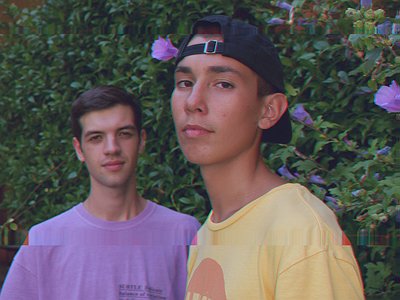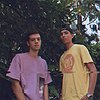Part 1
Name: Riccardo Pestrin and Federico Tarozzi
Nationality: Italian
Occupation: DJ, Producer
Current Release: Shimmer/Moondance and Yama EP on Cascade Records
Recommendations: Gramatik by producer Epigramis a true inspiration for us since he combines jazzy guitar leaks, trumpet solos and blues chords to the electronic groundbreaking hip hop beats / La Moldava by Smetana, a classical piece of music which represents the homonymous river dear to the composer, this piece is very close to us since it’s one of the pieces we played in the orchestra and we really love it because it’s very dynamic and emotional.
When did you start writing/producing music - and what or who were your early passions and influences? What is it about music and/or sound that drew you to it?
We started making music together almost one year ago, but we were already friends for a long time. We met in the classical music environment because we both played violin in the same orchestra, so music was (and still is) a big part of our lives. Our musical influences are different: on the one hand hip hop and rap, on the other electronic and EDM.
For most artists, originality is first preceded by a phase of learning and, often, emulating others. How would you describe your own development as an artist and the transition towards your own voice? What is the relationship between copying, learning and your own creativity?
We try to avoid emulation. Since our musical influences are so diverse, our goal is to take parts from all the genres that we love and blend these pieces together even if they don’t belong to the same environment, creating something that belongs to us and that we feel is unique. However, from the point of view of a beginner, emulating is an important part of the process of learning how music production works.
What were your main compositional- and production-challenges in the beginning and how have they changed over time?
We had a clear idea of what we wanted to do since the beginning, however, blending all the various sounds together to make something that we could both like was the first challenge we came across. We didn’t want our pieces to sound too classical neither too electronic, finding the perfect balance was quite hard. The second aspect was building, inside the DAW, characteristic sounds and schemes recognizable from us and our audience, that we felt represented “FARDUST” in every aspect.
What was your first studio like? How and for what reasons has your set-up evolved over the years and what are currently some of the most important pieces of gear for you?
We are the exact representation of what is called a “bedroom producer”, so we don’t have a real studio. However, we left space for some upgrades such as new midi controllers, better headphones, microphones and monitors that could help us improve our productivity and our approach to music. Our go-to gear is our midi keyboard and our computer with FL Studio from Image Line.
How do you make use of technology? In terms of the feedback mechanism between technology and creativity, what do humans excel at, what do machines excel at?
Every part of our production goes through our computer, both the recorded stuff and digital stuff. Machines offers us endless possibilities, our “power” is to take these options and craft them into something neat and unique.
Production tools, from instruments to complex software environments, contribute to the compositional process. How does this manifest itself in your work? Can you describe the co-authorship between yourself and your tools?
Software is the foundation of our work. Inside the DAW we create our sounds by tweaking and tuning our electronic VSTs from scratch. Our synths are an empty canvas that we fill with the colours of textures and tones to create (what we think is) our signature sound.
Collaborations can take on many forms. What role do they play in your approach and what are your preferred ways of engaging with other creatives through, for example, file sharing, jamming or just talking about ideas?
Jamming and talking about music is key to the process of making a song. Firstly, because when you play notes (even randomly sometimes), most of the time you end up finding a melody you can insert into your track or an idea for another demo, this is actually one of the most exciting moments in terms of creation. The second is a less impulsive process that for us, since we are a duo, is fundamental as well: sharing ideas and thoughts help us decide which is the best direction to give to our songs, we take into consideration every idea we have even if it is crazy or impossible to realise. File-sharing is very important too, because we collaborate with another producer, Azureskye, in our upcoming EP and because one other track we made was composed in two different cities and the only way to get around the fact that we were separated was to share the project between our computers.
Could you take us through a day in your life, from a possible morning routine through to your work? Do you have a fixed schedule? How do music and other aspects of your life feed back into each other - do you separate them or instead try to make them blend seamlessly?
We are students, so we can’t take music production as a full-time thing, however when we aren’t able to open our DAW and create, we get inspiration and ideas in every moment, and we share these thoughts when we meet each other. We agreed that we must meet each other at least once a week to talk about ideas and produce songs, this is the only “rule” that we have, when we are together there’s no schedule or fixed thing so that we can feel totally free to create and make new stuff.






